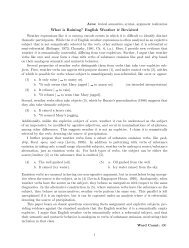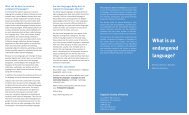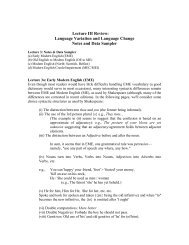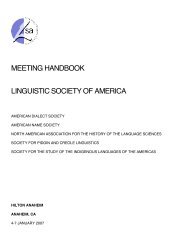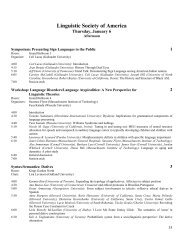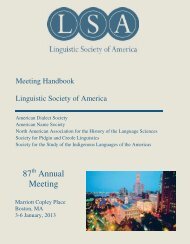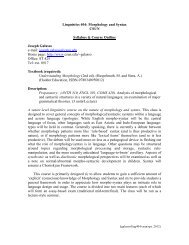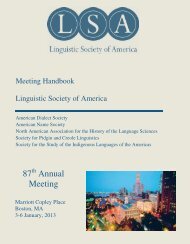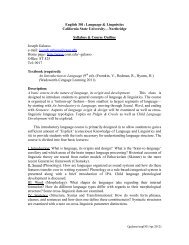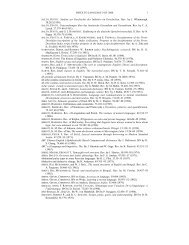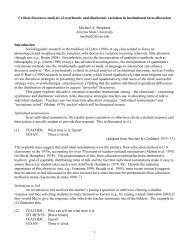Annual Meeting Handbook - Linguistic Society of America
Annual Meeting Handbook - Linguistic Society of America
Annual Meeting Handbook - Linguistic Society of America
You also want an ePaper? Increase the reach of your titles
YUMPU automatically turns print PDFs into web optimized ePapers that Google loves.
Thursday, 8 January<br />
Plenary Address<br />
Grand Ballroom<br />
8:30 - 9:30 PM<br />
The syntax-discourse interface:<br />
Lyn Frazier<br />
University <strong>of</strong> Massachusetts-Amherst<br />
Processing ellipsis<br />
How do perceivers parse and interpret elided constituents (silence) There is a long standing debate in the linguistic literature about<br />
whether syntactic 'reconstruction' is required for an elided constituent (e.g. the elided VP in Max laughed. Tina did [ ] too.) or whether a<br />
purely semantic or discourse account will suffice. We present several experimental studies <strong>of</strong> VP ellipsis and sluicing which were<br />
designed to investigate the interplay <strong>of</strong> syntax and discourse in processing ellipsis.<br />
We use the results <strong>of</strong> the studies to argue that the syntactic and discourse systems differ not only in terms <strong>of</strong> their vocabulary, the<br />
kinds <strong>of</strong> structures implicated, and their characteristic domains but also in terms <strong>of</strong> their salience properties: Recently encountered<br />
material, material low in the syntactic tree, is most salient in the syntax whereas material that is part <strong>of</strong> the 'main assertion', typically<br />
material high in the syntactic tree, is most salient in the discourse representation. We also argue that spelling out the interplay <strong>of</strong> the<br />
syntactic and discourse systems in processing ellipsis may help us to understand certain contrasts when sluicing may violate island<br />
constraints and when it may not.<br />
Overall the results favor syntactic approaches to ellipsis. However, it is well-known that syntactic accounts <strong>of</strong> ellipsis undergenerate:<br />
They permit ellipsis only in circumstances where a syntactically parallel antecedent is available. But clearly ellipsis sometimes takes<br />
place when no syntactically-appropriate antecedent is available. Recent 'mixed' or hybrid accounts <strong>of</strong> ellipsis claim that the type <strong>of</strong><br />
antecedent that is required, syntactic or only semantic, depends on the type <strong>of</strong> discourse coherence relation at issue. Preliminary<br />
evidence suggests that these accounts are also inadequate and that the best approach to the undergeneration problem may involve<br />
alterations <strong>of</strong> the antecedent at LF.<br />
Lyn Frazier (PhD, U CT, 1978) is a pr<strong>of</strong>essor in the Department <strong>of</strong> <strong>Linguistic</strong>s at U-MA-Amherst. She is interested in how the<br />
grammar is mentally represented and used in adult language comprehension. With her long-term collaborators, C. Clifton and K.<br />
Rayner <strong>of</strong> the Department <strong>of</strong> Psychology, she has developed and tested experimentally various theories <strong>of</strong> syntactic processing. She<br />
has co-edited Language acquisition and language processing (with De Villiers) and Perspectives on sentence processing (with Clifton &<br />
Rayner); co-authored a book on processing adjuncts, Construal, (with Clifton); and published a monograph on semantic processing,<br />
On sentence interpretation. She is co-editor <strong>of</strong> the Kluwer series Studies in Theoretical Psycholinguistics. Her current research<br />
examines the interface <strong>of</strong> syntax with prosody, funded by an NSF grant (with Clifton), and the interface <strong>of</strong> syntax and discourse, funded<br />
by an NIH grant on ellipsis (with Clifton). She also holds a grant on eye-movements during reading (with Rayner).<br />
50



